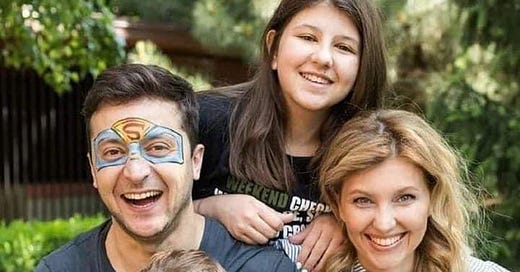What real strength in a leader looks like
The central figure of the New Testament projected strength, not by taking off his shirt, but by giving his life.
Here’s my March column for the Holland Sentinel…
In the days since the Russian Federation invaded Ukraine, an unexpected and inspiring leader has emerged. His name is Volodymr Zelenksy.
Not many Americans had heard of Zelensky before the first set of impeachment charges were brought against then-President Donald Trump for withholding military aid from Ukraine in exchange for a political favor. Today, because of the Russian invasion, Zelensky’s name and video selfies are everywhere in the news and social media, and many are impressed with his courage and determination. It’s a fascinating story.
Early on, Zelensky seemed to many in the West to be a cartoonish figure because, before running for office, he had a starring role—curiously enough as President of Ukraine—in a satirical TV comedy called “Servant of the People.” (He even won Ukraine’s version of “Dancing With the Stars” in 2006.)
So, how did this actor-comedian become president of Ukraine in 2019, winning more than 70 percent of the popular vote? The answer, we like to imagine, is that he came out of nowhere, and then, thrust on the world’s stage, somehow became a hero to millions not only in his own country, but around the world. The truth, as always, is more complicated.
His entertainment background has undoubtedly served him well in today’s media-obsessed culture. His recent selfie videos in the streets of Kiev, Ukraine’s capital, are a master class in communication in the 21st century. But Zelensky is more than an actor.
Though a native Russian speaker, he later became fluent in both Ukrainian and English. So, some serious language skills, not a given in the entertainment world, but critically important in regional and international politics. In 1995, Zelensky enrolled at Kyiv National Economic University, and graduated in 2000 with a law degree, before pursuing a career in acting, not law.
His parents are similarly well educated. His father is a professor (and head of the department) of cybernetics and computing hardware at Kryvyi Rih National University, and his mother once worked as an engineer. Zelensky’s wife, Olena Zelensky, studied architecture at Kryvyi National University and later pursued a career as a screen writer.
What impressed so many, however, were not Zelensky’s credentials, but his character and demeanor in the days since Russia invaded his country. Not all well-educated and media-savvy leaders have responded as well in a crisis. Think of Senator Ted Cruz, a Harvard Law School graduate, who took his family on vacation to Cancun a year ago while Texas was experiencing a major power crisis, the result of severe winter storms, leaving 4.5 million homes and businesses without electricity for several days. At least 246 people died, either directly or indirectly, because of that crisis. The negative publicity brought Cruz back to the state a day later.
In contrast, Zelensky has stayed in Kiev and reportedly turned down an American offer of a safe exit from the country. What he wanted, he said, was not a ride, but “ammunition.” By the time this column appears, Zelensky may well have been captured or killed.
In the U.S., media and politicians have long argued about what makes for a “strong” leader. Jimmy Carter was often portrayed during his presidency as “weak,” and many would like to portray Joe Biden in the same way. Trump, on the other hand, famously tried to project strength and did his best to avoid projecting any weakness, such as when he took his famous but ill-considered car ride during his hospitalization for Covid. Vladimir Putin, president of the Russian Federation, has also tried to project an image of strength, even going so far as to pose shirtless while riding a horse.
But what is it that we look for in leaders beyond perceived strength and weakness, beyond performative demonstrations of masculinity? I think Zelensky has shown us at least a little of what real strength looks like.
What I see in Zelensky is what has come to be known as “servant leadership,” a term that appears nowhere in the Bible, but has deep biblical roots. The central figure of the New Testament projected strength, not by taking off his shirt, but by giving his life. Servant leadership means serving the people, instead of expecting the people to serve the leader. A servant leader is willing to give his life for the people.
Zelensky is projecting that kind of strength, and it’s unusual enough that when people see it, they comment about it and are drawn to it. Here is a leader who has inspired the courage and devotion of his people. More of that, please.





Powerful message! Thanks, Doug.
Nailed it again Doug.